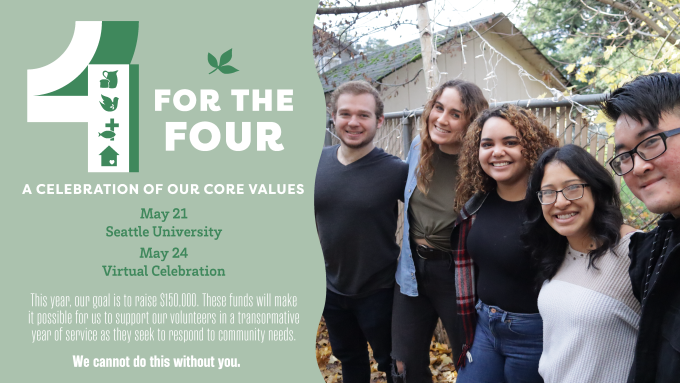Stories of Connecting Families with Fresh Food
Over the past year, Melissa Mardo has been serving as a JV AmeriCorps member in Spokane with Catholic Charities of Eastern Washington. Focusing on food access, her tales of cooking, teaching, and interacting with youth weren’t quite what she had initially envisioned when she began her service.
At Catholic Charities of Eastern Washington (Spokane), my JV AmeriCorps service is within the Food For All program. As a Community Food Resources Specialist, we aim to build better access to healthy, affordable food for vulnerable families by connecting them to the fruits of our local food system. Some of the ways I help connect families is with our produce delivery, since the food grown on our own 12,000 square foot farm is given to Catholic Charities Housing Communities. In addition, plant starts from our Buy-One Supply-One plant sale are donated to housing communities and local community gardens.

I was able to spend time this year in Food For All’s greenhouse. After the annual plant sale, the next two weeks involved donating flowers and vegetable starts to Catholic Charities Housing Units and various community garden sites. I assisted with a planting event at a Catholic Charities Housing Unit whose primary residents are suffering from chronic homelessness. The residents were beyond excited for the cherry tomato plants and one person decided to test out the pumpkin plant in her two new garden beds. I talked with one woman who decided to try the abundantly-producing sungold tomatoes: her reasoning was that if people from the next-door homeless shelter were to enjoy some from her plant, she would still have some tomatoes leftover. She knew what it meant to be hungry so she remained optimistic while preparing her two new garden beds, even if there would be some uninvited visitors. It is so easy for many of us to find excuses not to garden. “I’m tired” or “I don’t have time” are common refrains from many of us, yet knowing about probable plant destruction did not stop these residents from filling all 20 garden beds full with plant starts.

During my time in Spokane, I was also able to visit Hutton Settlement, a children’s home, to bake squash bars for their culinary class. My initial assumption that children would disdain vegetables appeared to be true. As each child entered the room and heard we were using squash to create a dessert, they scrunched up their noses, stuck out their tongues, and whined, “Ewww.” I knew when I was younger I would have had the same reaction, but what surprised me is that every child was still willing to try the food. While initially hesitant about a vegetable-based “dessert,” being involved with the process made them invested in the outcome and they were ultimately curious to try these mysterious squash bars.
Throughout this year, I’ve loved meeting so many kids that love their vegetables. I run a kid’s booth at a farmer’s market where each week we offer a new activity related to exercise or nutrition and the children can earn $2 to spend at the market if they participate in the activity. The coupon is valid for fruits, vegetables, plant starts, or herbs. Each week the kids tell me they are excited to buy carrots or strawberries. Recently, a mother shared with me that the reason they visit the market each week is because her three kids are begging to do the new activity. While she talked with me, the kids debated whether to pool their money to buy radishes or each purchase a plant-start to add to their home garden. Since the children earn their own $2, they are excited to go shopping and buy a vegetable for themselves. The program allows us to empower children to use their money for fresh fruit and vegetables and feel included at farmer’s markets.
Whether it is trying a new food or starting a garden bed for the first time, I have witnessed everyone’s willingness to try this year. And I think we all can use some of that openness. It was easy to make assumptions entering into this service year. I wrongly thought that people would be uninterested in kale, rainbow chard, or turnips. This year, the places I deliver produce to and the parenting classes I coordinate have all requested that I bring more vegetables and fresh fruit. My JV AmeriCorps service at Food For All makes it possible for anyone to access more fruits and vegetables, thus increasing healthy food options throughout the community.


